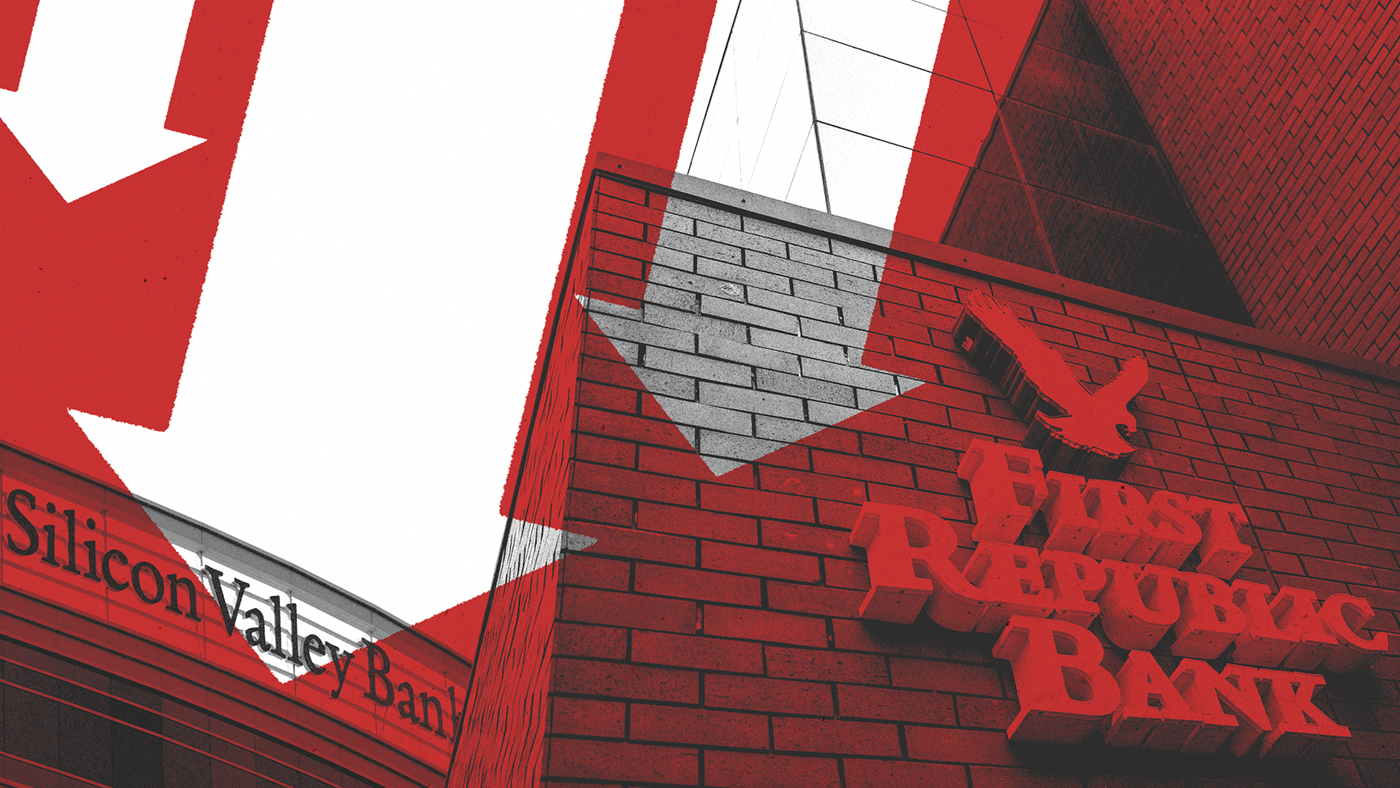Are recent bank failures actually contributing to a recession?
"The troubles lurking in the balance sheets of small banks could have a large effect on the economy"


A free daily email with the biggest news stories of the day – and the best features from TheWeek.com
You are now subscribed
Your newsletter sign-up was successful
It's been a tough time for banks lately. The sector's fallout began with the total collapse of Silicon Valley Bank (SVB), a financial institution that provided funding to tech startups. SVB failed after a stock plunge caused a run on its deposits, and the Federal Deposit Insurance Corporation (FDIC) was forced to step in and receive the bank.
However, the company would not be alone on the mountaintop of collapse for long, as the similarly troubled Signature Bank and First Republic Bank were also subsequently taken over by the FDIC and sold. First Republic in particular was the second-largest bank failure in U.S. history, The Wall Street Journal reports. Both Signature and First Republic were preceded in collapsing by deposit runs, and the latter has since had all of its assets sold to JPMorgan Chase in an attempt to stop the hemorrhaging. There has also been trouble across the pond, as Swiss bank Credit Suisse, one of the largest financial service groups in the world, was purchased by its main competitor, UBS, in an attempt to stop a fallout of the European market.
With all of these companies seeming to bottom out, some analysts are flagging a potential disaster on the horizon. The outlook on the global economy was already pessimistic heading into 2023, partially due to rising inflation and high interest rates. Some have cautioned that the collapse of these banks is likely precipitating a global recession. Others, though, seem to think that the issue lies simply in the fact that many of these banks have fallen victim to poor regulation — something that the U.S. government has readily admitted.
The Week
Escape your echo chamber. Get the facts behind the news, plus analysis from multiple perspectives.

Sign up for The Week's Free Newsletters
From our morning news briefing to a weekly Good News Newsletter, get the best of The Week delivered directly to your inbox.
From our morning news briefing to a weekly Good News Newsletter, get the best of The Week delivered directly to your inbox.
What are the commentators saying?
While a bank like SVB was not one of the United States' larger institutions, "the troubles lurking in the balance sheets of small banks could have a large effect on the economy," The New York Times writes. Even if a recession is avoided, the Times adds, there could be fundamental changes, as small banks "could change their lending standards in order to shore up their finances, making it harder for a person to take out a mortgage or a business to get a loan to expand."
Concerns remain particularly high in the U.S., where "the economic outlook now hangs on two factors: private-sector confidence and Federal Reserve interest-rate policies," Jon Hilsenrath and Rachel Wolfe write for The Wall Street Journal. The pair add that previous recessions in 1990, 2001, 2008, and 2020 were all spurred by major events, such as the Sept. 11 terrorist attacks and the COVID-19 pandemic. The ongoing bank fallouts could potentially crater the economy, the pair write, as they "represent a new threat" to the global market.
Part of the problem with smaller banks like SVB is that it "shows some of the risks of banking outside the big banks," Steven Fazzari, a professor of economics at Washington University, tells Time. Between the ongoing bank fallout and continued inflation, "governments around the world have been working to prevent a recession," but have had a tricky time doing so, Fazzari adds. He notes that in the case of the U.S., the Federal Reserve has been raising interest rates, which in turn raises the cost of borrowing. As a result, if banks "become concerned about the risks of lending and make it harder for businesses and individuals to borrow money, it could contribute to a recession," Fazzari says.
Despite this, some have cautioned that these banking problems are concerning, but not an absolute death blow. "I don't think of this as being equivalent to Lehman, or Sept. 11, or Iraq invading Kuwait," Richard Clarida, a global economic adviser at Pimco and a former vice chair of the Federal Reserve, tells the Journal. He warns, though, that "whatever your views were on the odds of a recession before this, they've probably gone up."
A free daily email with the biggest news stories of the day – and the best features from TheWeek.com
What's next?
Time notes that Oxford Economics did predict a "slight recession" would arrive in 2023. This is largely due to the Fed "being too aggressive in raising interest rates," Oxford says. However, governments have been stepping in to try and pick up the slack, the outlet notes, which could help alleviate some economic pressure.
Right now, organizations "are flush with cash" Ryan Sweet, the chief economist at Oxford, tells Time. So while it is possible that "another shoe could drop," says Sweet, "it does seem to ease a lot of concerns that this is turning into a systemic event."
"That should help limit the severity and duration of the recession," he adds.
Justin Klawans has worked as a staff writer at The Week since 2022. He began his career covering local news before joining Newsweek as a breaking news reporter, where he wrote about politics, national and global affairs, business, crime, sports, film, television and other news. Justin has also freelanced for outlets including Collider and United Press International.
